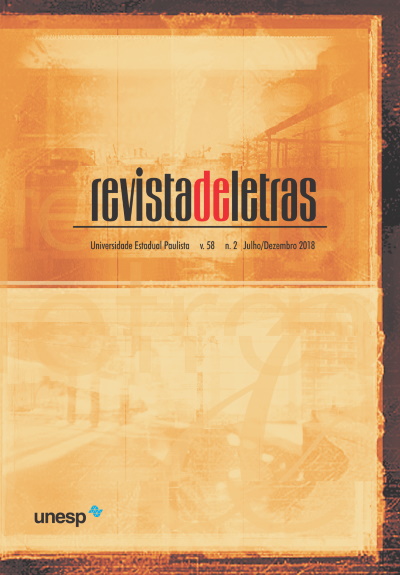Pliegues, repliegues y despliegues textuales técnicas posmodernas en la narrativa de Roberto Bolaño
Palavras-chave:
Roberto Bolaño, Intertextualidad posmoderna, Perspectivismo, Equivalencia metatextual, Apropiacionismo, Innovacionismo autorreferencial,Resumo
En el presente artículo, se intentará demostrar el uso de técnicas literarias posmodernas en La literatura nazi en América publicada en 1996 por el escritor chileno Roberto Bolaño (1953-2003). Para organizar el examen de la novela, trabajaremos a partir de cinco categorías de elaboración propia, pero basadas en los conceptos entregados por los críticos Alfonso de Toro, Pavao Pavlicic, Ihab Hassan, María del Pilar Lozano y Donald Shaw. Las categorías son: “Intertextualidad posmoderna”; “Perspectivismo”; “Equivalencia metatextual”; “Apropiacionismo”; e “Innovacionismo autorreferencial”. Todas ellas, son utilizadas por el autor de la novela para conseguir un mismo objetivo: poner en el centro del ejercicio escritural al texto mismo, con sus pliegues, repliegues y despliegues, dando cuenta del derrumbe de los metarrelatos y la emergencia de la realidad como una multiplicidad de discursos e interpretaciones en pugna. Así, Bolaño utiliza la literatura fascista en la América del siglo XX (con autores, obras y un intenso paisaje cultural inventado, ficticio), para espejear las tradiciones y vanguardias, los compromisos y militancias, las obras totales de nuestra narrativa y poesía, con el devenir político y social del continente, abarrotado de ideologías, mesianismos y relatos teleológico de innegable raigambre moderna.
Downloads
Publicado
Edição
Seção
Licença
Os manuscritos aceitos e publicados são de propriedade da Revista de Letras. Os originais deverão ser acompanhados de documentos de transferência de direitos autorais contendo assinatura dos autores.
É vedada a submissão integral ou parcial do manuscrito a qualquer outro periódico.
A responsabilidade do conteúdo dos artigos é exclusiva dos autores.
É vedada a tradução para outro idioma sem a autorização escrita do Editor ouvida a Comissão Editorial.

